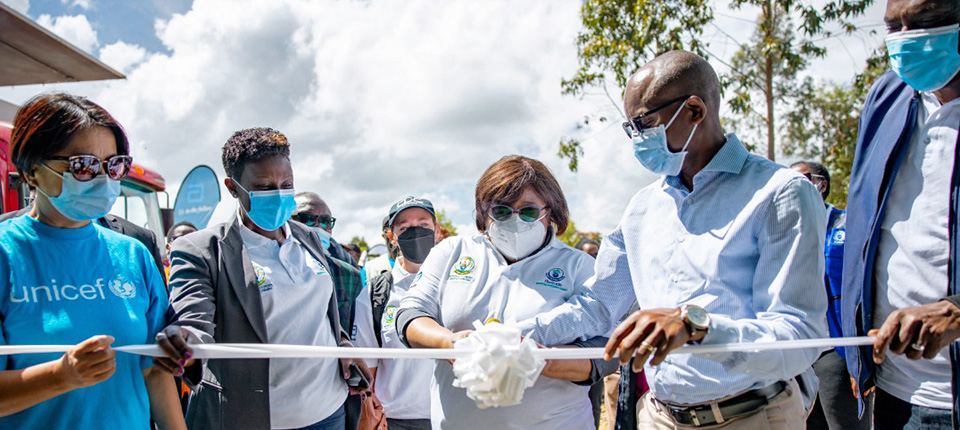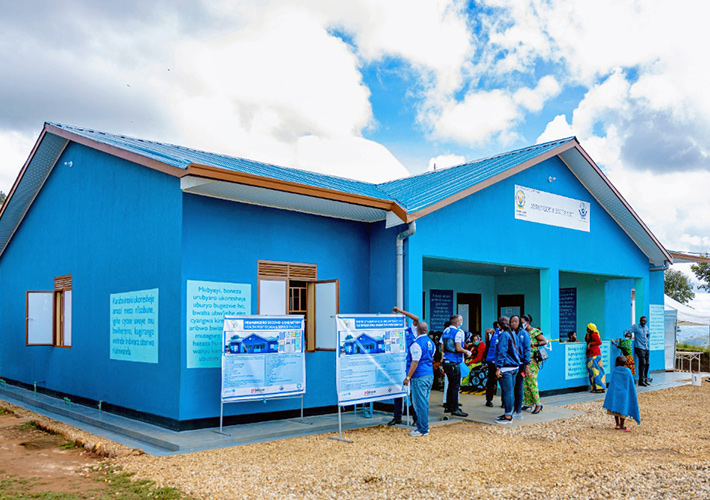Collaboration Continues to Expand Access in Rwanda
Strong results of pilot program lead to launch of two new second-generation health posts, broader planned expansion.

In Rwanda, more than 80 percent of people live in rural areas where access to primary healthcare is often limited, and many lack access to reliable transportation and financial resources to get to regional healthcare centers. Because of these gaps in access to care, rural Rwandans often find themselves walking long distances or sometimes forgoing medical attention altogether because getting to a doctor is too challenging.
A New Approach to Rural Care in Rwanda
Recognizing that good health is foundational for long-term prosperity, the Rwandan Ministry of Health set out to help all Rwandans access quality healthcare within a 30-minute walk from their homes. As part of that effort, community clinics, called “health posts,” were built in select locations across the country, providing an important link between community health workers and larger health centers.
Driven by our goal to deliver better access and affordability in healthcare, we joined the Rwandan Ministry of Health and the non-profit Society for Family Health (SFH) Rwanda in 2019 to help take the health post model to the next level. We partnered to expand access to primary care and testing in rural Bugesera District through the launch of eight “second-generation health posts” (SGHPs).
Compared to first-generation health posts, the SGHP model offered more services such as outpatient diagnosis and curative care, child immunizations, growth monitoring for children under five years, antenatal and maternity care, family planning counselling and health education. This model proved to deliver effective, sustainable care – which is now leading to an even greater impact.
Expanding Access to Quality Testing and Care
Based on the successful Bugesera SGHP model results, the Rwanda Ministry of Health, SFH and Abbott recently joined together with UNICEF Rwanda and SC Johnson to expand this decentralized healthcare model with the launch of two new second-generation health posts in Nyaruguru District, a rural area near the Burundi border. Located in Mishungero and Cyanyirankora, the new health posts will help improve patient outcomes and quality of life while reducing the workload and referral time to upper-level health facilities (health centers and district hospitals). In addition, UNICEF supported capacity enhancement of 38 health post operators and other health providers, program monitoring and staff recruitment in Nyaruguru for an initial period of 15 months.
Collaboration Continues to Expand Access in Rwanda
A new second-generation health post was dedicated in the Nyaruguru district, bringing accessible, affordable and enhanced quality healthcare services to rural communities in Rwanda.
Rapid diagnostic tests will play a critical role in the delivery of improved testing services. Many patients in rural areas are unable to make multiple trips to healthcare facilities for diagnosis and treatment. With test results in minutes rather than days, patients can gain access to needed care during the same visit – providing better health outcomes, as well as more efficient care for already overtaxed health systems.
One example: pregnant women can be tested for a number of conditions at the same time, including HIV, syphilis, hepatitis and malaria – diseases that can have serious health consequences for both mothers and their newborn babies.
“Second-generation health posts have been playing a significant role in improving health outcomes and increased health seeking behavior as well as addressing the gaps in healthcare service delivery, especially in our rural areas,” said Dr. Ngamije Daniel, Minister of Health for Rwanda.

Second-Generation Health Posts Deliver Strong Results
According to a health economics study by Brandeis University, second-generation health posts provide primary healthcare services that generated good health at a low cost – with a substantial, favorable increase in the amount of curative outpatient care per person, especially for potentially life-threatening malaria and acute respiratory infections. The posts have also played a significant role in improving access to affordable healthcare services and quality of life for rural Rwandans, while operating as successful, self-sustaining businesses. A few examples:
- Compared to first-generation, second-generation health posts provide care to 122% more patients monthly, with more than 286,000 people receiving health services since inception.
- 20% of the population in service areas – one in five people –seek monthly healthcare services at the posts, often for multiple diagnoses.
- More than 65,000 people were screened for malaria, resulting in the treatment of more than 21,000 cases, including 14% among children 5 years old and under.
- Screening also alleviated more than 105,000 respiratory infections and resolved over 57,000 cases of intestinal parasites.
Second-Generation Health Post Model
Expanding Across the Country
Looking ahead, the Rwandan government and SFH are planning further expansion across the country, transitioning over 200 existing health posts into second-generation health posts. This includes expanded services such as antenatal and maternal healthcare, on-site microscopy and rapid diagnostic testing, family planning, mental health, annual physical exams and more.
Abbott is supporting the first phase of this initiative by providing funding to advance capacity-building and training of 64 health post operators and their staff. To help ensure sustainable operations, nurse operators and staff will be certified on:
- Basic emergency, obstetric and newborn care
- Integrated management of childhood illness
- Management of infections, expanded program on immunization and pandemics
- Noncommunicable disease (NCD) screening and management
- Entrepreneurship and business management
To learn more about the collaboration and how it is helping communities in Rwanda, visit Abbott’s Rwanda feature page, Expanding Health Access in Rwanda.




